On the outskirts of Prishtina is a large construction with expansive flat surroundings containing nothing but grass. Belonging partially to the Municipality of Prishtina and partially to the public heating company Termokos, it has stood vacant for years.
The place holds numerous commercial possibilities if privatized. The first thing that comes to mind, is a big shopping mall, with a handy parking space; maybe a cage with two big brown bears inside as an attraction for visitors.
Yet something weird has happened. Something by the standards of today’s government mentality — something by the usual standards of Prishtina — unimaginable, unthinkable: It was not privatized. No shopping mall! No sad apathetic bears! The grass still grows there — green!
Why were the standard pocket-fattening procedures not applied in this case. What went wrong?
Instead, some young people have taken over the place, and they want to make a space for social and cultural gatherings. They say they want to offer today’s teenagers, something that they did not have in their youth: A place where people help others without financial interest, and all that is asked, is to use the place to grow as a human being.
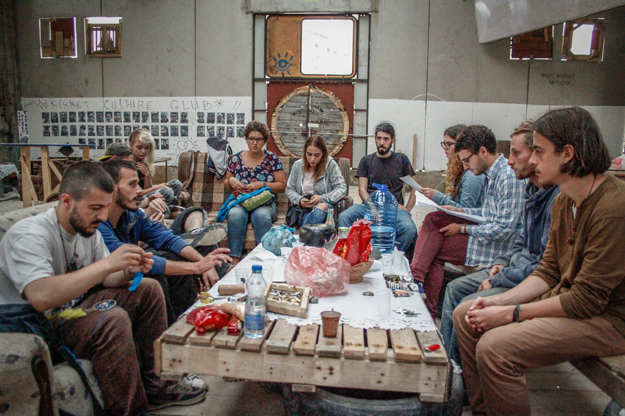
They call the place, Termokiss — originally known as ‘Termokos’ (Termo-thermal, Kos-Kosovo), it has now evolved into a thermal (but as of yet, platonic) kiss.
K2.0 went to take a look, and to investigate this novel idea that youth and culture are more important than profit.
Let the ideas flow
“Frankly we are tired of the cultural influences that the coffee bars are bringing,” says Nikki Murseli, an architect by profession, and part of the Termokiss community.
“Going out all day and staying in a coffee bar, it’s something we all did, and still do. It’s an unproductive use of time, sitting for four hours in a place, hatching an egg and smoking cigarettes,” she continues, annoyed.
“What we want is something different, not different in the sense that it’s something that the world hasn’t seen, but different for [Kosovo] — because the world’s already done it; it’s us who are way behind.”
Termokiss is a social space, but beyond that a concrete definition is hard to come by because it’s a concept that is ever-evolving, shaped by the ideas of the people who frequent it. It could host picture or art exhibitions, movie screenings, a small library, cultural events, musical gigs, charity events, lectures, experience sharing, competitions in chess or ping pong — you name it and it could happen.
"Going out all day and staying in a coffee bar, it’s something we all did, and still do. It’s an unproductive use of time, sitting for four hours in a place, hatching an egg and smoking cigarettes."
With some elements already in place, an artistic explanation of Termokiss’ practical functioning when fully finished would be something like this: A teenager, who after picking her nose, checking her Facebook, and flicking through TV channels, gets bored and absently starts staring at the wall. Suddenly she has a flash of an idea, runs to the Termokiss building and yells, ‘EUREKA!’ She can explain her idea to others, and if it finds their support, everyone else involved in the project would play their part in helping to make it happen.
Njomza Dragusha, an environmental engineering student who has been active in the project from the very begining, says that the main reason that they want to develop this new spirit in Prishtina is to include and discover new talents in Kosovo, particularly those who have to date struggled to find the support of institutions or other bodies.
“The social space, or the social center is super open for all kinds of ideas,” she explains. “Now this community other than working is also trying to expand all the time. If someone comes with ideas, and they don’t have the proper conditions to develop them, they can present them here and all the community within this space voluntarily will engage to develop that person’s idea.”
For people who feel different, for those who just need somewhere to hang out and help out, Termokiss is trying to be that social place that fulfills those human social needs and helps ideas to flourish. “Even if you don’t have anything concrete, it’s enough to express and find yourself, and to include yourself in a new community which is ready to accept you in all the ways you want to exist,” assures Dragusha.
As in all places where dynamic socializing happens, Murseli believes that at Termokiss you can grow as a human being and learn skills and values that are necessary in life; reliability, tolerance, coping with challenges and problems, being socially aware of yourself and your surroundings and of your qualities and limits. And, she adds, it’s all for free!
“We are trying to bring that idea, the feeling of integrity, the feeling of being together,” she says. “Not only as individuals who go out for a coffee and sit in a place. When you come here, you will not meet only that person with whom you arranged to drink a coffee. Every time I come here I meet someone new, every time I come here I learn something new. And not only from conversation but from deeds as well.”
In a coffee bar, it would be strange if you go and introduce yourself out of the blue to new people; in Termokiss it would be strange if you don’t mingle and socialize.
Building a concept
The original idea for Termokiss came from a similar project in Brussels called Allee Du Kaai; the temporary space takeover, which is open six days per week was implemented by the international organization Toestand, a Belgian NGO which specializes in revitalising abandoned objects.
At Allee Du Kaai, there is always some activity going on, such as workshops, exhibitions and concerts, explains freelance graphic artist Gigi Lougy who works with Toestand — people even come and bring stuff that is then donated to the city’s refugees. “It’s like a meeting point in between,” he explains. “People give what they don’t need, money as well, but you need to find these good people and show them what you do.”
Following the success of Allee Du Kaai, Toestand were on the lookout for a location for their next project. After hearing about Prishtina from Kosovars living in Brussels, they made their decision. “We want to show you a bit of how you can do things without money, without budget,” he says. “Because actually you can do this with recuperation material, if you have enough time, good contacts, if you can find wood and find lots of material. And people have to help each other to make things [happen].”
In order to initiate the project, they contacted Info Quartier Mache a Swiss organization and together they approached the people behind Prishtina Architecture Week — just like that, a new project was born: Toestand Mache Prishtina.
Local environmental engineering student Dragusha, together with architecture students Krenare Juniku and Donald Alimi, became engaged with identifying a location and preparing the groundwork for revitalizing the structure. “The idea of the project was that the space, which would be revitalized, would be left to the citizens in its entirety,” says Dragusha. “The easiest way for us to do it was to not pay rent. Most public buildings or spaces are occupied so it was really difficult to resolve that issue.”
Juniku wrote a book on abandoned public spaces in Prishtina for her undergraduate degree, which included information on the Termokos building. Dragusha says they had dreamed up grand designs for one day revitalizing this place, so knowing of its status and potential they choose it as the most suitable option.
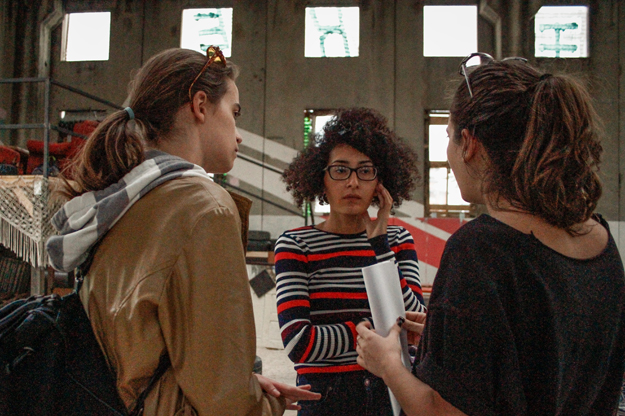
“The land as a parcel belongs to the municipality of Prishtina, whereas the structure is built by Termokos, so the most logical way to approach it was to talk to both sides,” says Dragusha. Termokos officials liked the idea, she recalls, but they wanted approval from the Municipality of Prishtina, who in turn wanted approval from Termokos.
“The procedure went slowly because the director of culture [at the Municipality of Prishtina] didn’t take the project seriously,” says Dragusha. “But after different interventions and lots of pressure we managed to get a [temporary] permit.”
Members of the community told K2.0 that on a visit to Termokiss officials from the Municipality of Prishtina pledged to support the initiative, although they have yet to release a notarized permanent permit for using the space. Now all the Termokiss community can do is hope that something more lucrative or an ‘organic need’ to privatize it does not shatter their objective.
Learning by doing
With the location set, a small budget was required to get things started. On the other side of Europe during the early summer’s Euro 2016 football championships, Toestand organized a big screen in the center of Brussels and sold beers — they made 8,000 euros, enough to begin revitalizing the structure.
Around 40 volunteers from Belgium and Switzerland traveled to Prishtina in July by bus and started ‘hipster’ working, aided by people from Kosovo. “We found an empty building without a roof which was used by junkies,” says Lougy. “We put in a floor, we put in windows, we put a roof on and we made all the basics to use this space. And from now on the people of Prishtina can continue with what we began and make something good out of it, kismet.”
Like with any social idea, it hasn’t been all plain sailing. Since opening on July 16, the place has been vandalized three times, prompting Lougy to return to Prishtina recently, accompanied by his wife Louke Loco and metal worker Loic Welder, to fix shutters and secure the place.
“I have to be honest now, there were people who to our faces were really nice,” says Lougy, referring to the local youngsters who he believes vandalized the place. “The day after we left they broke in and they put Nazi signs everywhere. We gave them a chance, we welcomed them, we said that you can be here: ‘No problem, we see that you are Nazis but we will give you a chance.’ But they stabbed us in the back.”
The first time they broke in, many things were stolen and the walls were inscribed with (inaccurate) Nazi symbols. The second and third times it was more about simple vandalization. According to members of the Termokiss community, the vandalization had nothing to do with the Nazi ideology, but just kids misbehaving.
Those behind the initial idea are the first to admit that there is always room for improvement, and they always welcome criticism to help them learn. Reflecting on his short time in Prishtina, Lougy says he encountered a tendency to “say a lot, but to do less”. “There are a lot of good ideas, a lot of good comments, but you have to do what you say,” he says. “This is the real art … If you do this, than you can be the best.”
He also suggests that in some cases a mindset change has been necessary, to adapt to a different way of doing things. “You have to learn to work for free, because it’s not only money money money; if you work you get satisfaction and you will be happy. Money is not going to make you happy but the satisfaction is in doing something to help in a project, to become something where everybody can come and you are a part of it. I hope the people here can feel this.”
Lougy suggests that one thing to work on is becoming a more pro-active community. “The neighbors were passing by wanting to know what was going on,” he explains. “We were [due] to organize an information meeting with them, but it never happened.”
Right now Termokiss is functioning without running water, electricity or sewers, putting a strain on the project and making it impossible to organize all the events that the community would like to; there are plans in the making to organize fundraising events where possible donors would gather and be introduced to the vision and concept of the place, and hopefully donate funds to create the basic conditions for many events to happen.
"In the beginning when you go somewhere and do things you make mistakes, but you learn from it, and you get up and you get stronger and better, always."
Lougy believes that the issues to date are all teething problems, from which the community will learn. “Every project that you work on like this is like an unborn baby,” he says. “In the beginning when you go somewhere and do things you make mistakes, but you learn from it, and you get up and you get stronger and better, always. And with this project you don’t know where to go, but everything will go well, if it is a good theme, if you find the right people, then you can lead everything to a good end. And I think there are a lot of people motivated to join the team.”
One such person is psychology student Endrit Jashanica who originally got involved when a friend called him and asked for a saw to cut some wood when they were helping to make the building more secure. “I came here and brought the saw, and I saw three people working. It was Lougy, Louke and Loic,” he recalls. “I got involved and started working with them every day for 3 or 4 hours.”
Although he had no prior skills in handy work, he found the determination to go on from the good vibes he got from the place. “This place has given me good energy knowing it will become something very useful for this community, a place for culture, art and socializing,” he says, before appealing to others to get involved, even if they don’t think that they have any particular skills.
Another is architect Murseli, who aside from playing her part in Termokiss, also has a day job. She says that she is participating in the initiative because she feels a responsibility to leave a legacy for the younger generations, something her generation was not afforded.
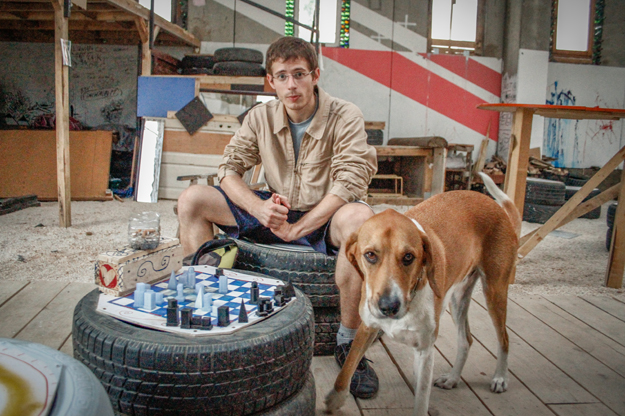
Presently, she adds, people who attend Termokiss meetings and events are multiplying every day. “This is a place for [teenagers],” says Murseli, who is herself in her late 20s. “They have the excess energy which they need to spend somewhere, because we already have day jobs and things going on. But still I feel it as a responsibility to help, so one day my sister or my brother or my cousin can have a place to come and to do something which we could not.”
But, Termokiss is only in its infancy, it’s a new concept, and in Prishtina people can be wary of getting involved in new things and social circles. So, Murseli who has been living and studying in Italy for the last five years knows that it will take a lot of effort to get the message across. “We are yelling in a deaf place,” she says. “Therefore we need to force it a bit so the reverberations are felt.”
Journey to the unknown
Where once stood just four huge cold walls, a place of needles, wild grass and a pervading smell of pee, now stands a cozy social place. If someone out of the blue, or out of some personal interest, decided to donate all the money required to finish the place down to the last nail, then Termokiss would lose an essential part of its philosophy and charm.
The place is not meant to be completed in one day; it is meant to grow. And while Termokiss takes form, and finds itself and its unique essence, the community behind it goes through a parallel journey. Individuals learn the values of friendship, work, honesty, kindness and loyalty as part of a community that aims not to be exclusive, but open, patient, welcoming and simply an accepting social place.
But let’s be honest, although it’s open for everyone that wishes to participate in it, the community views are liberal — if you’ve been bombarded all your life with prejudice against all that is different the concept of developing people over profit is a tough one to take in.
That or the shopping mall?K
Termokiss will be holding a fundraising concert on Friday, October 7.
Photos: Fikret Ahmeti.



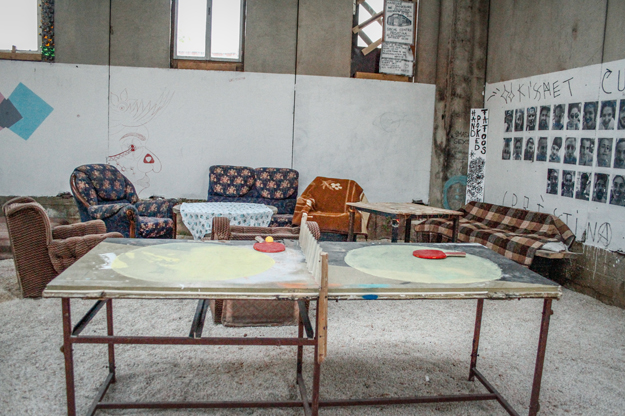

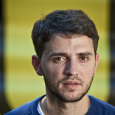
I'm so excited to hear about this project happening in Pristina. We are also trying to do the same project in Prizren among the youth here. Kosova needs these spaces everywhere to help create innovation and openness. Love it!